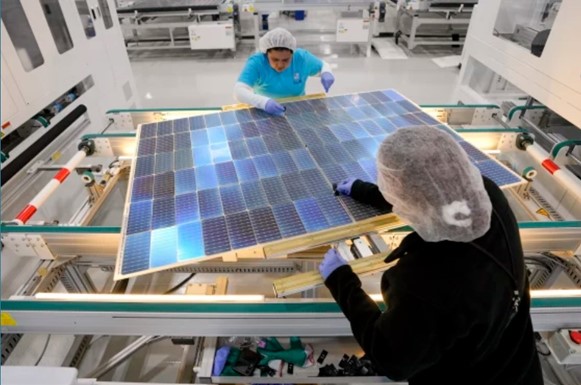
Inflation Reduction Act Ignites a Surge in Manufacturing and Clean Energy Development
Since the passage of the Inflation Reduction Act (IRA), 271 manufacturing projects focused on clean energy technology and electric vehicles have been announced across the United States. This legislation has spurred a manufacturing boom, attracting tens of billions of dollars in investments, particularly benefiting rural communities in need of economic revitalization.
However, the future of these investments may be influenced by the outcome of the upcoming U.S. presidential election. Some investors, concerned about the possibility of a Republican victory, fear that the IRA could be weakened or even repealed.
Data from the Massachusetts Institute of Technology and the Rhodium Group indicate that companies have announced $133 billion in investments in clean energy technology and electric vehicle manufacturing since President Joe Biden signed the IRA into law in August 2022. Actual manufacturing investments have reached $89 billion, marking a 305% increase compared to the two years prior to the IRA. Overall, the IRA has leveraged half a trillion dollars in investments across the manufacturing, energy, and retail sectors.
Trevor Houser, a partner at the Rhodium Group, highlighted the transformative impact of the IRA on the manufacturing sector, stating that the current level of new manufacturing activity is unprecedented in recent history, largely driven by the establishment of new clean energy manufacturing facilities.
The 271 announced manufacturing projects are expected to create over 100,000 jobs if completed, according to the advocacy group E2, a partner of the National Resources Defense Council. These investments have been particularly beneficial for rural communities, which have seen a significant influx of new investment, unlike the more urban-focused investments in AI, technology, and finance.
The IRA has also accelerated the deployment of renewable energy, with $108 billion invested in utility-scale solar and battery storage projects. Over the past two years, investments in solar and battery storage have increased by 56% and 130%, respectively, according to Rhodium data. Houser noted that mature technologies like wind and solar, as well as electric vehicles, have now reached a point where they will continue to grow regardless of future political developments.
Despite this progress, the "manufacturing renaissance" is still in its early stages and remains vulnerable, according to Houser. Chris Seiple, vice chairman of Wood Mackenzie's power and renewables group, emphasized that the resurgence of new factories would not have taken off without the IRA.
Former President Donald Trump has threatened to dismantle the IRA, advocating for increased oil, gas, and coal production. During a rally in Wisconsin in May, Trump promised to impose an immediate moratorium on new spending grants and incentives under the IRA if re-elected, referring to it as a "green new scam" and vowing to prioritize fossil fuel projects.
The uncertainty surrounding the upcoming election has led to fluctuations in clean energy stocks, with some investors delaying decisions until they have a clearer view of the policy environment. Mark Widmar, CEO of First Solar, noted growing constraints on access to capital for early-stage solar companies and larger players seeking to build domestic manufacturing capacity.
Despite these concerns, many executives and analysts believe that the investment, production, and manufacturing tax credits driving much of the clean energy and technology spending will likely survive even under a Republican administration. Notably, 85% of IRA-related investments have gone to GOP congressional districts, highlighting the benefits these credits bring to Republican-leaning areas.
John Ketchum, CEO of NextEra Energy, pointed out that the positive impact of clean energy credits within the IRA is increasingly recognized by Republican lawmakers, making it difficult to reverse these tax laws. He also noted that recent developments in the presidential race, including Vice President Kamala Harris' rise as the Democratic candidate, suggest that any attempts to repeal the IRA might face significant challenges.
In fact, 18 Republican members of Congress recently warned House Speaker Mike Johnson that repealing IRA energy tax credits would be detrimental to ongoing investments and development. John Berger, CEO of rooftop solar installer Sunnova, expressed caution about the potential for further declines in clean energy stocks, suggesting that the presidential race remains highly competitive.